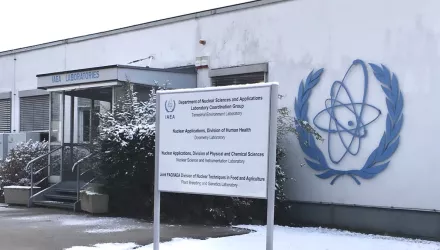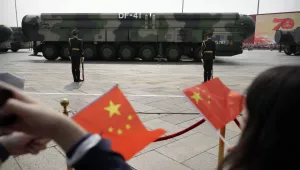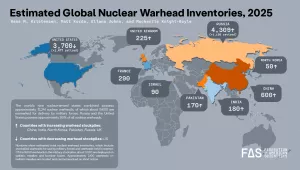POLICY RECOMMENDATIONS
- Exhibit confidence in U.S. strength by showing a willingness to act unilaterally to improve Russian-U.S. relations and international security in general.
- Seize the high ground in arms reductions and reduce the U.S. strategic nuclear inventory without waiting for Russian reciprocity. Use this unilateral willingness to destroy U.S. weapons to insist on the halting of rogue nuclear programs by any means required.
- Halt North Atlantic Treaty Organization (NATO) expansion.
- Abandon national missile defenses, particularly the proposed program in Eastern Europe, and replace the concept with a U.S. vow to destroy rogue Intercontinental Ballistic Missile (ICBM) programs rather than be forced to defend against them.
- Continue to press Russia for improvement in democratic development as part of the normal price of partnership in the Atlantic community.
There is no endemic reason for Russian-U.S. relations to be as tense as they have become over the past several years. Th is situation is largely due, on one side, to mishandling of Russian affairs by both the Clinton and Bush administrations, and on the other by the obvious manipulation of anti-Americanism for domestic gain by the Vladimir Putin and Dmitry Medvedev administrations in Russia. Unfortunately, this means that only unilateral U.S. action can undermine the cynical policies of the Russian leadership and restore dynamism to the Russian-U.S. relationship.
THE SOURCES OF SOVIET-U.S. TENSIONS
The "organic" source of Soviet-U.S. tension during the Cold War was Soviet ideology. The Soviet Union, by its very nature, was a declared enemy of the international status quo in general (even as the Kremlin participated in that international order and gained from it) and of the United States in particular. Under the last Soviet leader, Mikhail Gorbachev, the Soviet Union finally accepted the state-centered international order as legitimate and accepted a place in it—and this itself became part of the ideological precondition for the actual collapse of the Soviet Union. Once Moscow repudiated its ideology, the fact that both sides still had large arsenals of conventional and nuclear forces did not affect the onset of a period of relative comity and cooperation after 1989.
It is sometimes argued that weapons, and nuclear weapons in particular, were the source of the Cold War, but nuclear weapons are what keep cold wars "cold"—they do not cause them. This point about arms races should be obvious, but often is ignored: if nuclear weapons caused cold wars, then we would right now be in a "cold war" with China, or perhaps even France or any other nuclear power. (And would India and Pakistan, to take a current example, find sudden accommodation with each other if nuclear weapons no longer existed? Hardly.)
CURRENT SOURCES OF CONFLICT
- Errors by successive U.S. administrations since 1992, including NATO expansion far beyond Moscow's expectation (and even the expectations of many Americans, who are rightly concerned about the extension of U.S. security guarantees to a dozen additional states in less than fifteen years). Other examples include the diplomacy surrounding the Kosovo war and the withdrawal from the Anti-Ballistic Missile (ABM) Treaty—which was militarily and strategically meaningless, but was done so brusquely that it opened the United States to further criticism as a high-handed superpower.
Perhaps the worst mistake in recent years was Washington's announcement of plans to place missile defenses in Eastern Europe, a decision that can only be interpreted as sheer strategic blindness or deliberate provocation. (My own view is that it was the former, not the latter.) It was a move that gained nothing at a huge diplomatic cost and handed the Russians a drum to beat loudly—which they have. - Meanwhile, Moscow has acted with outright thuggery toward its neighbors (which, ironically, fuels the arguments of those who wish to expand NATO). Even if one accepts the argument that Georgia provoked the recent war with Russia, for example, Russian behavior lived down to the reputation for arrogance and brutality that Moscow so justly acquired in its campaigns in Chechnya. Russian petulance over perceived slights—and the willingness to punish innocent bystanders like Germany and Greece by interrupting gas supplies—is a needless impediment to better relations with United States and Europe.
Over the past decade, Russia, like China before it, has become the international equivalent of an emotional teenager, threatening to lock itself in its bedroom until it gets the Olympics or whatever other unwarranted sign of international respect it demands. - Both the United States and Russia have taken actions that can be perceived as "meddling" in each other's backyards, but these are as artificial as most other U.S.-Russian spats. The dispatch of Russian aircraft, for example, to South America was basically a stunt; the Russian Air Force can barely fly over Russia and cannot project power into this hemisphere. (Both the Bush and Obama administrations essentially chose not to react, which is the most reasonable approach to such juvenile displays.) Meanwhile, Western discussion of the inclusion of Ukraine in NATO is, at this point, needlessly provocative and is void of strategic logic but rich in raw material for cynical Russian nationalists.
THE CASE FOR COOPERATION
Russia, whatever Moscow's talk about its status as a "Eurasian" power, is fundamentally a Western nation in both political form and social organization. This is important, because it means that the United States and Russia have a great deal in common when it comes to the security agenda of both nations. For example:
- Islamic terrorists hate Russia as much, if not more, than the United States. Since 9/11, Russia has actually suffered more large-scale terror attacks (including the butchery of dozens of schoolchildren in a hostage-taking) than the United States. Both sides have deep incentives to cooperate and share information—perhaps emulating the U.S.-French model, in which political differences have not been allowed to disrupt highly effective joint efforts against terrorism.
- It is neither in the U.S. or Russian interest to see more nuclear powers in the world, however entertaining it may be in the short term for Moscow to pit Washington and Tehran against each other. At the least, possession of nuclear weapons and a huge reserve of oil are at this point Russia's only claims to being a major power; it would be strategically imprudent for Moscow to dilute its own power by undermining anti-proliferation efforts.
- Russia's strategic nuclear arsenal is aging, and Moscow—which starved a good portion of its military research and development infrastructure for money for several years—cannot afford to replace it, despite the high-profile rollout of a new missile a few years ago. The Russians need reductions in strategic arms as much as the current administration wants them, but once again, Russia is saddled with a rigid leadership that wears nuclear strength and nationalism as badges of honor. (Sadly, a great many of the Russian people are taken in by this gambit, even though the average Russian would be better served by the building of an additional hospital than the development of defense-avoiding nuclear warheads.) The Russian military in particular is especially hostile to cuts in the Russian nuclear arsenal, because the military leadership knows and acknowledges openly that their conventional forces are too weak to be an effective defense (although a defense against what is never made clear in Russian debates over this subject).
- Russia and the United States are both weathering the global economic crisis better than may have been expected, but the Russian economy is fundamentally weaker on a structural level, so much so that Russia's claim to G-8 membership is hard to justify by any economic measure. Russia needs finally to accept that it has a role in defending the stability of the international economic system, just like all the other participants. While it may be tempting to use energy as a weapon, you cannot eat oil or drink gas, and sooner or later the games have to end and the resources have to be sold somewhere to be of any use to Russia.
ITEMS FOR THE U.S. AGENDA
The current administration, like its predecessors, adheres to a Cold War insistence on reciprocity by the Russians. This is actually not a partisan issue, but a generational one; Russian President Dmitry Medvedev once complained that "there are too many Sovietologists" in the U.S. foreign policy establishment, and for once he was right. It is time to change our fundamental approach to relations with Russia.
The United States should proceed from three basic principles when dealing with Russia:
- There is neither an obvious source of military conflict with the Russian Federation nor is there likely to be, no matter how much unseemly snarling Moscow and Washington may trade in the short term. Moscow is not going to give Hugo Chavez a nuclear weapon, and NATO is not going start bombing the Russian-Georgian border. Elaborate scenarios for a Russia-NATO conflict—such as the Russian military exercise a decade ago which ended with simulated nuclear strikes against NATO—are nonsense, and even the strategists who design them probably know it.
- The United States is economically and militarily the strongest nation ever to exist, and this reality is something that on the one hand chafes the Russians, but on the other is a fact of life—and will be for some time to come—that they cannot alter.
- U.S. strength means that the United States should take unilateral measures to reduce tensions and not wait for the Russians, since insisting on reciprocity is a recipe for gridlock.
Proceeding from those three assumptions, the United States should demonstrate both its strength and commitment to international security by taking the following actions:
- Do not wait for the Russians to match strategic nuclear reductions. The Russian and U.S. arsenals are simply too differently structured, with most of their megatonnage buried in the ground, and most of ours underwater, for negotiations to proceed on a reciprocity principle. (The commander of the Russian nuclear missile forces said in June 2009 that Russia should not in any case go below 1500 warheads, which essentially shuts off any real progress toward meaningful reductions, and the Chief of the Russian General Staff followed this up with a similar insistence that Russian nuclear forces stay at current levels. This does not leave much to talk about.) Unilateral destruction of strategic weapons will not only seize the moral high ground—especially if push comes to shove with utterly unrepentant proliferators like Iran and North Korea—but it will essentially dare the Russians to match our progress.
George W. Bush and Bill Clinton both pushed strategic nuclear arms onto the back burner of U.S. policy, but both left office with fewer nuclear weapons in the world than when they came in, which should be the duty of every U.S. president. - Abandon the missile defense program in Eastern Europe—but in doing so, firmly avow that there is no need for defense against Iranian missiles because the United States will never allow the Iranians (or, again, the North Koreans) to gain a nuclear ICBM capability. These smaller powers may argue—however disingenuously—that they have a right to develop long-range missiles as part of their legitimate access to outer space, but if those nations want a space launch capability, there are plenty of other space-faring nations who can help them. In the meantime, we can take a thorn out of Russia's paw while delivering a more credible message to would-be proliferators.
A commitment to destroy rogue missile programs is not a radical proposal: William Perry and Ashton Carter, both former Clinton administration officials, argued for destroying a North Korean long-range missile on its launch pad rather than let it be tested in 2006. (Carter is now back at the Defense Department.
In other words, the United States should be clear that two things will never be built: rogue ICBMs, and the useless missile defense programs that would not stop them anyway. We should make this issue irrelevant to Russian-U.S. relations (not everything is about Russia, Mr. Putin) and make clear that we do not seek to antagonize the Russians but that we also will not ask their permission if the moment comes to halt a mortal danger to the United States—no more than they would ask ours in a similar bind. - Halt NATO expansion. NATO expansion is an idea whose time never came, and long ago became a solution in search of a problem. If anything, NATO expansion is creating the situation it was supposed to avert, raising tensions in Europe instead of dampening them. Besides, no one has ever really been able to answer the question of what NATO expansion was supposed to prevent. The Russians can hardly subdue tiny Chechnya; they are not going to march over hundreds of miles (and 46 million Ukrainians) and attack Poland. (This assumes that for some obscure reason, Russia, Ukraine, and Poland come to blows over something.) NATO expansion had its origins in U.S. domestic politics, and that is where it should end. Again, we need not apologize to the Russians, no more than we need their permission to assure our own security or that of our allies, which is hardly threatened in Europe or anywhere else by the Russian military.
As a further step, the United States should attempt to make the Russians a more integrated partner in the fight against terror, treating Russia as a potential ally, and throwing the ball back into the Russian court. We can offer cooperation; if they do not seize it, then we have done all we can do. If we can overcome our differences with France and Germany on other issues and cooperate on terrorism, we can certainly do so with the Russians—who have far more to lose if that cooperation is not established. - Finally, Washington should use these unilateral measures to press the Russians about their progress as a democracy. This may seem like more advice to meddle in Russian internal politics, but if Russia wishes to be a member of the international status quo (and organizations like the G-8), it should act like one.
The Russian government has every right to repress its own people as much as they are willing to stand for; the U.S. government has the similar right not to invite such nations into its arms as a friend and trading partner. (If only we could apply this immediately to China, where U.S. policy for over two decades has been little more than a bipartisan accommodation of an openly aggressive power driven by our own addiction to cheap goods.) We should make it clear that we are not trying to dictate internal Russian political arrangements. But we cannot be blind to what happens in Russia; by that reasoning, why not just throw all our principles to the wind and invite hideous tyrants like Robert Mugabe or Alexander Lukashenko to the White House for tea?
In the end, the well that sustained the Cold War has run dry, even if unreformed Cold Warriors on both sides keep trying to draw from it. (There was nothing wrong with being a Cold Warrior, and the author counted himself among them during the conflict that ended in 1989—but to be a Cold Warrior, there should be an actual Cold War going on.) Russians and Americans will never be alike, but that should not be the goal of a wise Russia policy; rather, we should understand that we come from a common Western family of nations, and therefore share many of the same interests—and are under the same threats.
Statements and views expressed in this memo are solely those of the author and do not imply endorsement by Harvard University, the John F. Kennedy School of Government, or the Belfer Center for Science and International Affairs.
Nichols, Thomas. “Improving Russia-U.S. Relations: The Next Steps.” June 2009





